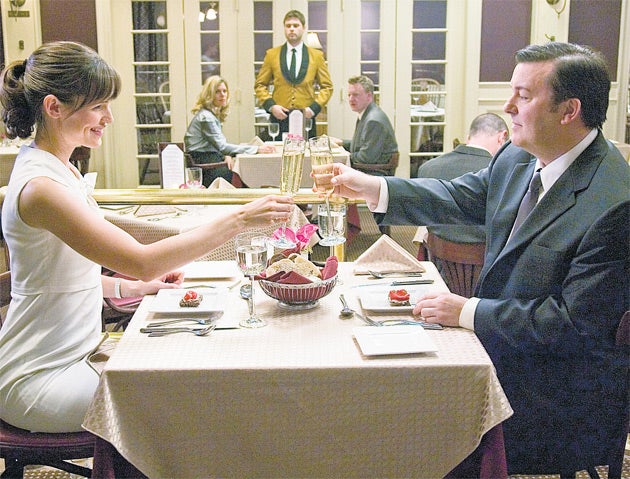The Invention of Lying (12A)
This self-flattery fails to deceive us

A society whose members never lie to one another is a society that simply couldn't function. From the little white lie ("You've lost weight") to the medium-sized porky ("Got flu and won't be able to come into work today") to the downright whopper ("I did not have sex with that woman"), the smooth running of our lives is founded, for good reasons and bad, on an ability to deceive. Ricky Gervais's new comedy is set in an alternate reality where the concept of lying doesn't exist: people literally talk nothing but the truth. Even their advertising slogans stick to the principle: "Pepsi – When they don't have Coke". It's a neat "what if" scenario which one imagines Gervais and his co-screenwriter, Matthew Robinson, had a lot of fun with, though the conceit proves more difficult to sustain the longer the movie continues.
Gervais, as well as writing and directing, also stars as Mark Bellison, a podgy fortysomething single guy leading an averagely unhappy life. He turns up on a blind date at the apartment of a willowy beauty named Anna (Jennifer Garner) and is hardly through the door before she's coldcocked him with a flurry of truths: she's been dreading this evening, he's not her type, this will definitely be their one and only date. There's telling it like it is! It's the same at work, where Mark is a writer of "13th-century history" for a film studio – "drama" and "fiction", both forms of lying, don't exist in this world – and is just about to be fired. So his colleague (Tina Fey) feels free to say how much she's disliked working with him, and his rival (Rob Lowe) openly calls him a "douche bag".
Things change when Mark, suffering a kind of synaptic shock, discovers an ability to lie. First it's a little thing: he tricks a bank teller into giving him $500 for free. Then he cons a traffic cop, who was about to charge his friend with drunk driving (really drunk – the friend falls out of his car). In the land of absolute credulity, Mark realises that the liar is king. The story looks set up to be a parable: granted this faculty of fibbing, will he use it for good or ill? Gervais's comic persona from TV – sly, competitive, lightly misanthropic – inclines us to think he'll take revenge on a world that has done him down. When he goes to a casino and cheats his way to a fortune, we see our potential for corruption enjoyably reflected in him. But then Mark turns into a rather unGervaisian altruist, offering comfort to a depressed neighbour (Jonah Hill). It seems like he wanted to be Robin Williams all along.
His biggest test comes when he visits his dying mother in a rest home ("Have you come here to dump an old person?" asks the receptionist). Realising how frightened his mum is as she faces "an eternity of nothingness", Mark tells her not to be scared, because she's going to a wonderful place where she'll meet all her loved ones again. He knows he's telling her a lie, but he sees how his assurance lights up her face, and the pity of it reduces him to tears. It's an interesting scene, though not one Gervais can naturally carry off, for sincerity isn't something he has yet mastered on screen. He is, in short, miscast, and it later becomes a problem when the film turns into a romantic comedy.
But for a while there's fun to be had once people start asking Mark about this afterlife he talked about at his mother's deathbed. His words of comfort land him in the role of religious soothsayer, and he gets himself into a terrible pickle trying to explain to a baffled public "the man in the sky" and all his mysterious ways. He's invented lying, and in the process he's invented God.
There's a kind of Pythonesque bathos about Mark as Moses: instead of tablets of stone he delivers his vague theology on empty pizza boxes. It's quite funny, though inconsistencies keep whining in your ear like a mosquito. Given that Mark is a writer, wouldn't he be able to come up with something more persuasive than "even if the man in the sky does bad stuff to you..."? Then you think about other glitches in the conceit, like that casino where the management admits "some of the games are fixed". So lying already does exist in this supposedly deceit-free world. Winding further back to the colleague who professed her dislike of him – if truth were the conversational basis, wouldn't that dislike have been made clear long ago? Ponder that absence of moral tact and you begin to wonder how this alternate world operates (even fantasy requires a logic). When people blurt out cruel but honest things about each other, there's no recognisable human response – it's not just lying that's gone missing, it's embarrassment, too.
Gervais fills the gaps with a grouting of star cameos – Christopher Guest, Edward Norton, Jason Bateman, Philip Seymour Hoffman, Stephen Merchant – though their combined wattage can't distract from the sense that the film hasn't thought through its set-up. Gervais perhaps hoped his comedy would emulate the philosophical riddles of a Groundhog Day, positing an alternate universe that would have disquieting implications for someone who knows the world "as it is". But this topsy-turvy place hasn't the watertight consistency to persuade us, and its star, for all his talent, is not a romantic comedian. That's the truth as I see it.
Join our commenting forum
Join thought-provoking conversations, follow other Independent readers and see their replies
Comments
Bookmark popover
Removed from bookmarks